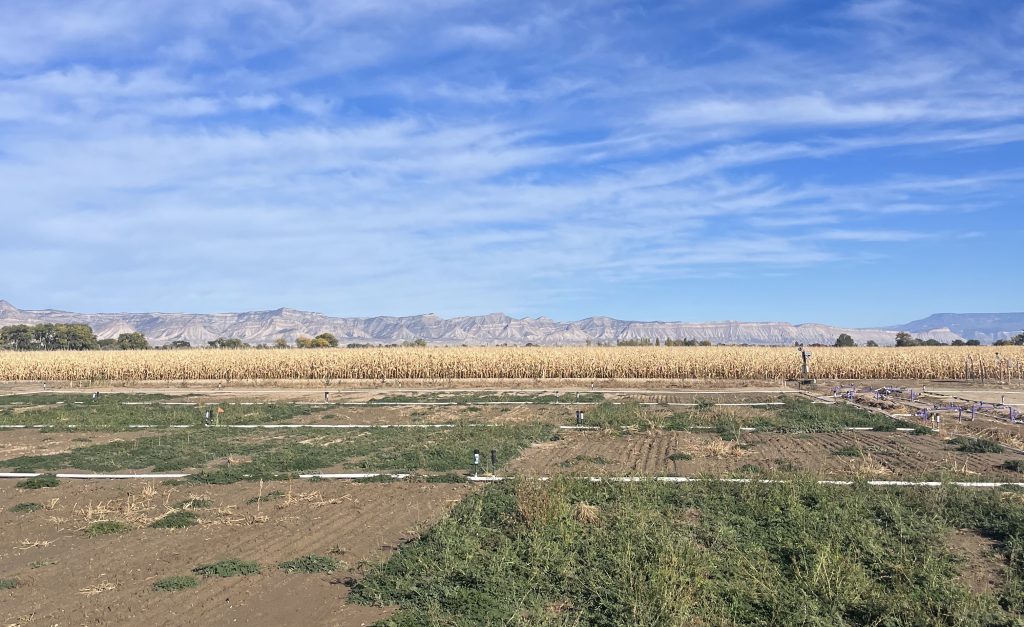
Ali Longwell/Vail Daily
Colorado started a soil health program in 2021 to help producers overcome the barriers to adopting practices that could improve soil quality and, in turn, increase production, improve water efficiency, improve the nutrient density of crops, and more.
However, in April, the Colorado Department of Agriculture, which runs the state program, learned it would lose its primary source of funding for the program due to changes at the federal level.
Colorado’s soil health program was awarded $25 million from the U.S. Department of Agriculture’s Partnerships for Climate Smart Commodities grant program in 2022. The Biden-era grant program was terminated by the new administration in April.
Brooke Rollins, the federal agriculture secretary, said in a news release that the grant program was “largely built to advance the green new scam at the benefit of NGOs, not American farmers.”
In place of the Climate Smart Commodities program, the U.S. Department of Agriculture also created a new grant in April called Advancing Markets for Producers, which set new guidelines for recipients of the previous program to retain their funding. Under these new guidelines, Colorado’s soil health program no longer qualified, and the funding was pulled.
The Climate Smart Commodities grant provided the majority share of funding for the Colorado soil health program and allowed the state to expand it in recent years.
According to Olga Robak, Colorado Department of Agriculture’s director of communications, the funding paid for many things in the state program, including department staff, research through the six intermountain state universities and funding for the subcontractors who were helping administer the program on the ground.
By the time the funding was withdrawn, the state agency had spent approximately $8 million of the award.
“This decision is having damaging impacts for Colorado farmers and ranchers and their critical work to advance producer-led soil health practices that will help ag producers adapt to and be more profitable in a drier future,” Robak said. “The cuts also led to broken trust between (the Colorado Department of Agriculture) and its partners, including producers who were relying on funding from this grant as they entered the growing season.”
The main impact of the withdrawal was on the subcontractors — conservation districts and other entities — that the state department relied on to help get the funding and soil health resources in front of ranchers and producers. In total, the agency had just under 50 subcontractors.
“The funding cuts had a ripple effect across our subawardees, who had to cut positions when they lost the (Climate Smart Commodities) funding,” Robak said. “While (Colorado Department of Agriculture) was able to avoid layoffs, the funding loss directly impacted how many staff are able to provide technical assistance directly to producers.”
The funding loss reduces the agency’s ability to provide the technical assistance and guidance in implementing soil health practices as well as in providing incentive payments to ranchers to adopt the practices. The assistance is just as important to the program’s success as the funding, Robak said.
With the loss of the federal funds, the state Department of Agriculture is now looking for ways to fill the gaps.
It does have some other funding, including a $300,000 appropriation from the state’s general fund and three one-time grant awards totaling around $1.3 million. It also secured ongoing state funding through the Agriculture Stewardship Tax Credit program totaling around $3 million, which will support soil health as a priority, Robak said.
Still, the agency will be looking for other funding sources to support it long term, as it sees the value in the program and the “far-reaching impacts” soil health practices will have on Colorado.
“This funding cut was a major blow to further understanding the effectiveness of these practices and will slow their widespread adoption,” Robak said. “(Soil health practices) help farmers and ranchers reduce operational inputs and build resilience that will help them weather an uncertain climate and unstable markets. These practices also provide ecosystem services that are important to all Coloradans, including far-reaching positive effects on wildlife, air and water quality.”

